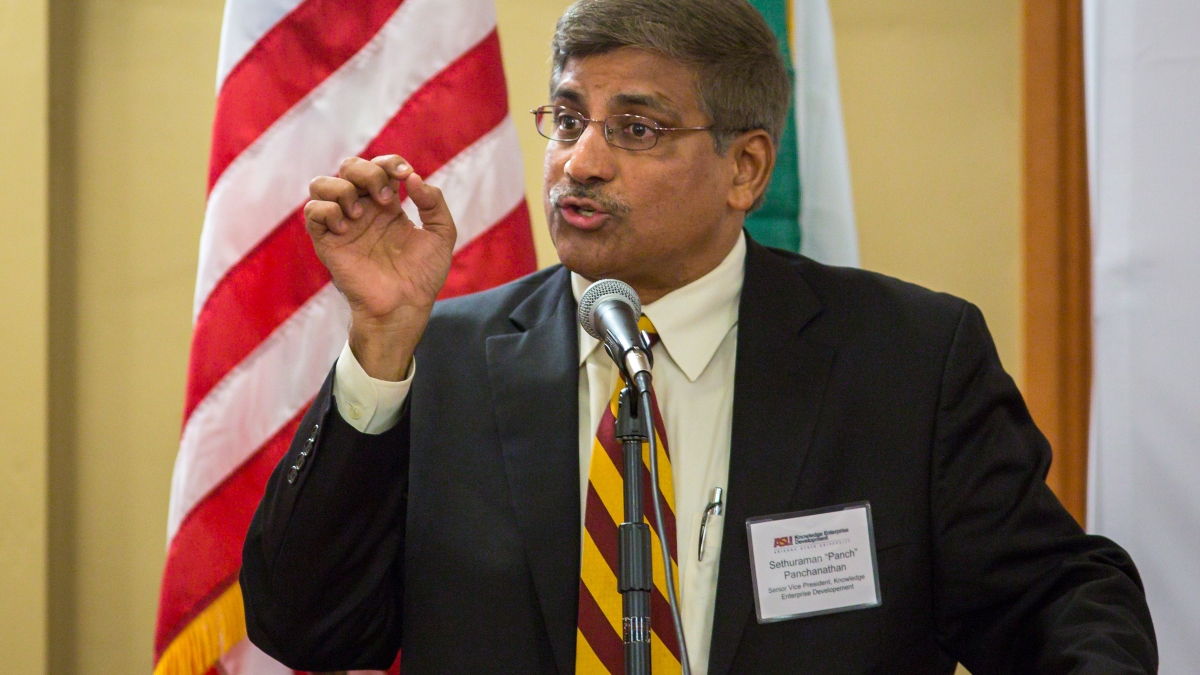ASU-Pakistan partnership to help South Asian nation find sustainable energy

Sethuraman “Panch” Panchanathan, senior vice president for the Office of Knowledge Enterprise Development at ASU, speaks about the partnership Aug. 27.
Arizona State University will help bring light to Pakistan via a partnership celebrated Thursday.
Officials gathered on the Tempe campus to mark the initiative, in which ASU is partnering with two top Pakistani universities for five years to hunt for energy solutions for the South Asian nation.
More than 70 percent of the Pakistani population does not receive steady electricity. About 1,200 people died in Karachi this summer because of lack of power for air-conditioning and water pumps, according to a U.S. government official at the event.
The collaboration will focus on applied research relevant to Pakistan’s energy needs. Together academia, industry and the Pakistani government will work to formulate a sustainable energy policy.
The U.S. Agency for International Development (USAID) awarded the $18 million project to ASU to establish the Partnership Center for Advanced Studies in Energy (PCASE) in association with Pakistan’s National University of Science and Technology in Islamabad and the University of Engineering and Technology-Peshawar.
ASU has worked with USAID on more than $40 million in grant-awarded projects; currently more than 30 projects are active. The grant to establish the Pakistani partnership is the largest USAID grant received by ASU to date.
“There are parts of Islamabad today that are without energy most of the time,” U.S. Sen. John McCain (R-Ariz.) said at the Thursday event. “I believe that this development will have a direct impact on the people of Pakistan.”
Sethuraman “Panch” Panchanathan, senior vice president for the Office of Knowledge Enterprise Development at ASU, said McCain is a senator who thinks globally.
“We are so fortunate to have him here today,” Panchanathan said.
Lately the two Pakistani universities have initiated programs that the population needs, said Mohammad Shahid, the pro rector of the National University of Sciences and Technology in Islamabad.
“We want to fill in the gaps,” Shahid said. “There is a dire need.”
It’s vital the project makes life better for the people of Pakistan, said Syed Imtiaz Hussain Gilani, vice chancellor with the University of Engineering and Technology in Peshawar.
“With things calming down in the political arena, I think this is the time for the private sector to come in and invest,” Gilani said. “It’s a country that needs everything, not just energy. … I hope the frontier spirit I feel on this campus drives some people to come forward and invest.”
The creation of the two energy research centers – one at each Pakistani university – is expected to improve U.S.-Pakistani relations.
Both countries’ interest in renewable energy supersedes whatever may be happening in the diplomatic realm, said Larry Sampler, assistant to the administrator in the Office of Afghanistan and Pakistan Affairs, USAID.
“Truly we are part of a wonderful team effort that going forward is going to do wonderful things,” Sampler said.